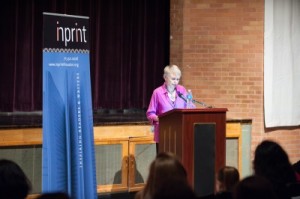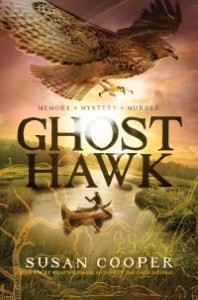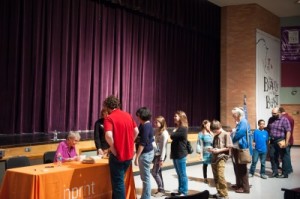Susan Cooper and the Battle between the Light and the Dark
March 13, 2014, by Elizabeth White
 Reading The Dark is Rising changed me. I was eleven years old, and I lived in Amarillo, a town known more for its empty vistas, feedyards, and tourist trap steakhouses than for its depth and mystery. In Amarillo—Houstonians, hold onto your seats, please—in Amarillo, it snows. Blizzards, even, slam down from the Rockies and beat the whitening world with a fury that seems like it will never cease. But, no highways shut down, no schools close. Amarilloans go about their merry way, as if they were Minnesotans.
Reading The Dark is Rising changed me. I was eleven years old, and I lived in Amarillo, a town known more for its empty vistas, feedyards, and tourist trap steakhouses than for its depth and mystery. In Amarillo—Houstonians, hold onto your seats, please—in Amarillo, it snows. Blizzards, even, slam down from the Rockies and beat the whitening world with a fury that seems like it will never cease. But, no highways shut down, no schools close. Amarilloans go about their merry way, as if they were Minnesotans.
So, being from Amarillo, snow was just snow until I read Susan Cooper’s The Dark is Rising. Afterward, snow was different, and so was everything else. Now, when I looked out at a white world, I sensed intense magic. And, when a frayed net of blackbirds dropped down into an elm, I glimpsed Will Stanton’s rooks, and I remembered, as in The Dark is Rising, that in every moment we are capable of great good and great evil. I remembered that there is a battle going on, and our actions matter.
And, so, it was with a flushed and reckless joy that I awaited the day that Susan Cooper was going to tell us about her new book Ghost Hawk at Inprint’s Cool Brains! reading. The weather that Sunday was gray and ominous, as is the weather in Susan Cooper’s books. As we waited for her to come to the podium, our anticipation of a cold front magnified the anticipation in the auditorium.
 Susan Cooper is white-haired and elegant. She speaks in a measured voice, her British accent crisp as snow. It seems no accident that she speaks slowly, for a pace unaffected by time is what one might expect from an author whose characters break free of time (in The Dark is Rising, Will Stanton steps into a previous century as easily as one steps into the next room, and in Ghost Hawk, **spoiler alert** Little Hawk views two-thirds of the story’s events from a place beyond time.)
Susan Cooper is white-haired and elegant. She speaks in a measured voice, her British accent crisp as snow. It seems no accident that she speaks slowly, for a pace unaffected by time is what one might expect from an author whose characters break free of time (in The Dark is Rising, Will Stanton steps into a previous century as easily as one steps into the next room, and in Ghost Hawk, **spoiler alert** Little Hawk views two-thirds of the story’s events from a place beyond time.)
Susan Cooper described the genesis of Ghost Hawk—several years ago, she moved to an island in Massachusetts to be near her children and grandchildren, and the beauty of the salt marsh surrounding her new home led her to imagine the Native Americans who once lived there. She said she writes of “the battle between the light and the dark,” a battle she knew with terrifying intimacy as a little girl huddled with her family in a bomb shelter as people died above.
Susan Cooper described the genesis of Ghost Hawk—several years ago, she moved to an island in Massachusetts to be near her children and grandchildren, and the beauty of the salt marsh surrounding her new home led her to imagine the Native Americans who once lived there.
American history is full of good and evil, and we prefer to look away from the latter. Cooper pointed out that everyone celebrates Thanksgiving to honor the famous first feast shared by the settlers and the Native Americans, but no one remembers that, “within sixty years of the friendly dinner, the settlers and Indians were all murdering each other.” In a battle called King Phillip’s War, more than six hundred settlers and three thousand Native Americans were killed. “It changed things forever,” she informed us, “and, we don’t consider that.” In Ghost Hawk, Cooper has revived a painful story that we must remember—and, grieve and learn from.
 When Susan Cooper was, sadly, finished sharing about her book and her writing process, I got my copy signed and headed outside. The air was chillier, the clouds grayer, than before she spoke, and I thought of Will Stanton, of how all Will wanted for his eleventh birthday was snow.
When Susan Cooper was, sadly, finished sharing about her book and her writing process, I got my copy signed and headed outside. The air was chillier, the clouds grayer, than before she spoke, and I thought of Will Stanton, of how all Will wanted for his eleventh birthday was snow.
I wanted it to snow, too. I knew it wouldn’t, not in Houston.
But, I didn’t need it to. The excitement of snow has spread to many other aspects of my life now that I’m an adult, and I know well the painful yet inspiring battle between light and dark. From the streets of Afghanistan to the streets of Houston to the streets of my own heart, the battle rages on. And, I knew that I had just left a place where the light was winning.


You recreate the atmosphere of that memorable book so beautifully. We’re you only eleven?